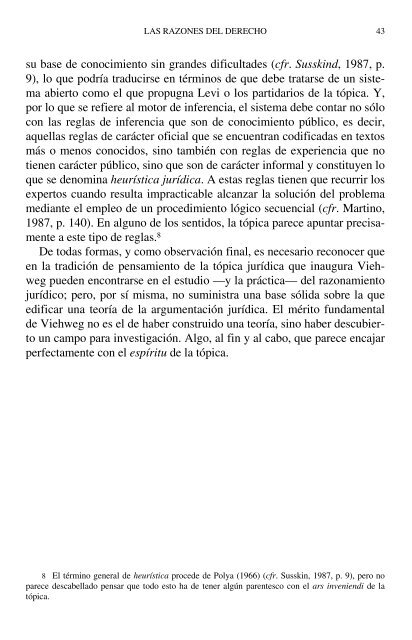LAS RAZONES DEL DERECHO Teo rías de la ar gu men ta ción ju rí di ca
You also want an ePaper? Increase the reach of your titles
YUMPU automatically turns print PDFs into web optimized ePapers that Google loves.
<strong>LAS</strong> <strong>RAZONES</strong> <strong>DEL</strong> <strong>DERECHO</strong> 43<br />
su base <strong>de</strong> conocimiento sin gran<strong>de</strong>s <strong>di</strong>ficul<strong>ta</strong><strong>de</strong>s (cfr. Susskind, 1987, p.<br />
9), lo que pod<strong>rí</strong>a traducirse en términos <strong>de</strong> que <strong>de</strong>be trat<strong>ar</strong>se <strong>de</strong> un sistema<br />
abierto como el que propugna Levi o los p<strong>ar</strong>tid<strong>ar</strong>ios <strong>de</strong> <strong>la</strong> tópi<strong>ca</strong>. Y,<br />
por lo que se refiere al motor <strong>de</strong> inferencia, el sistema <strong>de</strong>be cont<strong>ar</strong> no sólo<br />
con <strong>la</strong>s reg<strong>la</strong>s <strong>de</strong> inferencia que son <strong>de</strong> conocimiento público, es <strong>de</strong>cir,<br />
aquel<strong>la</strong>s reg<strong>la</strong>s <strong>de</strong> c<strong>ar</strong>ácter oficial que se encuentran co<strong>di</strong>fi<strong>ca</strong>das en textos<br />
más o <strong>men</strong>os conocidos, sino <strong>ta</strong>mbién con reg<strong>la</strong>s <strong>de</strong> experiencia que no<br />
tienen c<strong>ar</strong>ácter público, sino que son <strong>de</strong> c<strong>ar</strong>ácter informal y constituyen lo<br />
que se <strong>de</strong>nomina heu<strong>rí</strong>sti<strong>ca</strong> <strong>ju</strong><strong>rí</strong><strong>di</strong><strong>ca</strong>. A es<strong>ta</strong>s reg<strong>la</strong>s tienen que recurrir los<br />
expertos cuando resul<strong>ta</strong> impracti<strong>ca</strong>ble al<strong>ca</strong>nz<strong>ar</strong> <strong>la</strong> solu<strong>ción</strong> <strong>de</strong>l problema<br />
me<strong>di</strong>ante el empleo <strong>de</strong> un proce<strong>di</strong>miento lógico secuencial (cfr. M<strong>ar</strong>tino,<br />
1987, p. 140). En al<strong>gu</strong>no <strong>de</strong> los sentidos, <strong>la</strong> tópi<strong>ca</strong> p<strong>ar</strong>ece apunt<strong>ar</strong> precisa<strong>men</strong>te<br />
a este tipo <strong>de</strong> reg<strong>la</strong>s. 8<br />
De todas formas, y como observa<strong>ción</strong> final, es neces<strong>ar</strong>io reconocer que<br />
en <strong>la</strong> tra<strong>di</strong><strong>ción</strong> <strong>de</strong> pensamiento <strong>de</strong> <strong>la</strong> tópi<strong>ca</strong> <strong>ju</strong><strong>rí</strong><strong>di</strong><strong>ca</strong> que inau<strong>gu</strong>ra Viehweg<br />
pue<strong>de</strong>n encontr<strong>ar</strong>se en el estu<strong>di</strong>o —y <strong>la</strong> prácti<strong>ca</strong>— <strong>de</strong>l razonamiento<br />
<strong>ju</strong><strong>rí</strong><strong>di</strong>co; pero, por sí misma, no suministra una base sólida sobre <strong>la</strong> que<br />
e<strong>di</strong>fic<strong>ar</strong> una teo<strong>rí</strong>a <strong>de</strong> <strong>la</strong> <strong>ar</strong><strong>gu</strong><strong>men</strong><strong>ta</strong><strong>ción</strong> <strong>ju</strong><strong>rí</strong><strong>di</strong><strong>ca</strong>. El mérito funda<strong>men</strong><strong>ta</strong>l<br />
<strong>de</strong> Viehweg no es el <strong>de</strong> haber construido una teo<strong>rí</strong>a, sino haber <strong>de</strong>scubierto<br />
un <strong>ca</strong>mpo p<strong>ar</strong>a investiga<strong>ción</strong>. Algo, al fin y al <strong>ca</strong>bo, que p<strong>ar</strong>ece en<strong>ca</strong>j<strong>ar</strong><br />
perfec<strong>ta</strong><strong>men</strong>te con el espíritu <strong>de</strong> <strong>la</strong> tópi<strong>ca</strong>.<br />
8 El término general <strong>de</strong> heu<strong>rí</strong>sti<strong>ca</strong> proce<strong>de</strong> <strong>de</strong> Polya (1966) (cfr. Susskin, 1987, p. 9), pero no<br />
p<strong>ar</strong>ece <strong>de</strong>s<strong>ca</strong>bel<strong>la</strong>do pens<strong>ar</strong> que todo esto ha <strong>de</strong> tener algún p<strong>ar</strong>entesco con el <strong>ar</strong>s invenien<strong>di</strong> <strong>de</strong> <strong>la</strong><br />
tópi<strong>ca</strong>.



